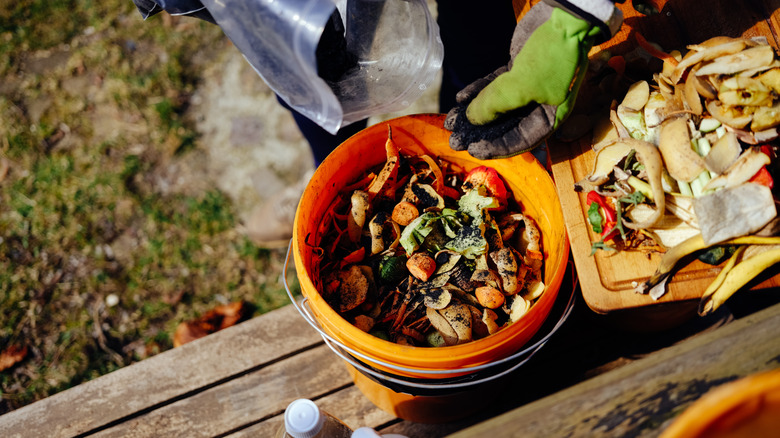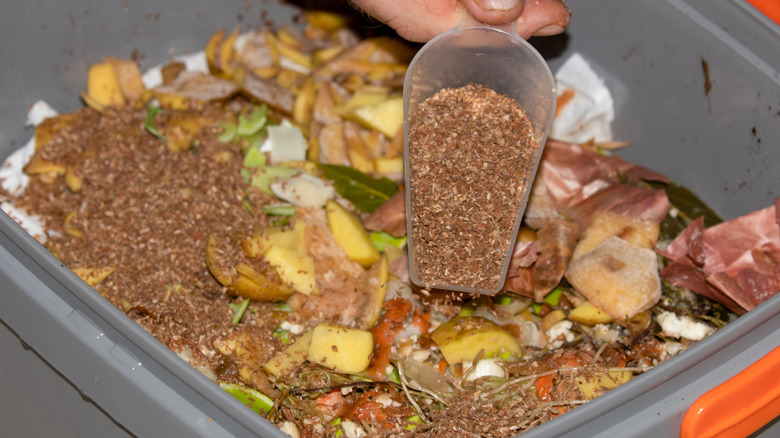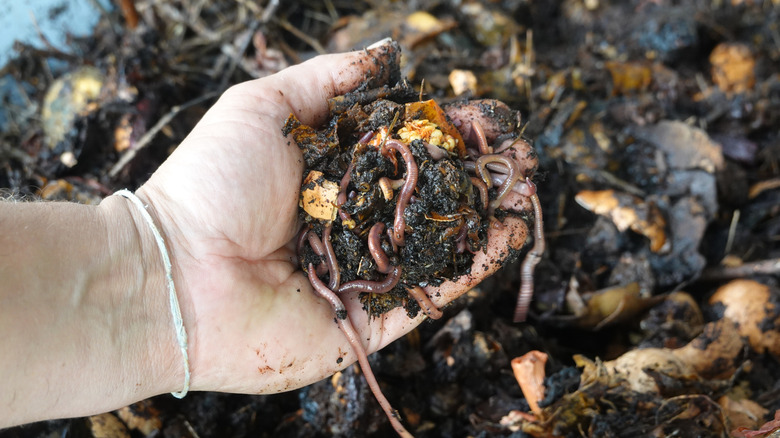Bokashi Vs Worm Composting: What's The Big Difference?
By just looking at it, bokashi and worm composting (vermicomposting) might seem like similar ways to create sustainable waste, but their processes and results differ quite a bit. Picking between the two methods when making your own DIY compost really depends on your needs and available space. Bokashi composting is a fermentation method that uses a specific type of bran to break down food scraps in an airtight container. Worm composting relies on little red worms to consume and then digest organic matter in an open-air bin. The most obvious difference is what each system can process. Bokashi handles meat, dairy, and other cooked foods that would normally harm worms, while vermicomposting works with plant-based materials.
The end product of this work also varies. Bokashi produces pre-compost that requires it to be buried in soil to complete the decomposition, making nutrient-rich fertilizer in about two weeks. Worm composting creates a ready-to-use product, but takes about three to six months to complete. Space requirements are a bit different as well. Bokashi can fit easily under a sink with its use of smaller airtight buckets, but worm bins need more room, proper airflow, and bedding. Perhaps one of the most obvious differences is smell, bokashi emits a slightly pickled smell when properly maintained, and healthy worm bins have an earthy aroma.
Why bokashi works for some but not others
Bokashi composting offers some very different benefits that make it ideal for certain people. Its ability to process all food waste, including citrus, meats, onions, and dairy, solves the limitations of many other composting methods. The fermentation process is faster, typically taking only two weeks to complete. This makes it one of the fastest methods of composting available. If you're short on outdoor space, bokashi composting might be perfect for you since it uses small airtight containers. The whole method can be done inside your home, making it ideal for those with smaller yards or apartment living. The process produces beneficial microbes that will improve your soil's health once the pre-compost is buried.
There are some challenges that bokashi composting comes with. The initial setup is more expensive than the basic worm bins, with specialized buckets and bran adding to costs. The fermentation liquid needs to be drained regularly to keep odors away, and any exposure to air can disrupt the process. Unlike vermicomposting, which produces immediate compost, bokashi's end product requires extra time in soil to fully break down. The pickled smell during fermentation may bother those with sensitive noses, but it isn't too off-putting. One thing to remember is that bokashi doesn't reduce the size of your waste like worm composting does, it simply prepares the scraps for later decomposition in soil. So don't expect to be able to just keep adding and adding waste as the process is happening.
When worm composting outperforms the bokashi method
Starting your own vermicomposting bin is best when you're looking to create ready-to-use fertilizer. Worm castings are often considered gold for the garden, packed with nutrients and beneficial microorganisms that plants love. Unlike the liquid leftover from bokashi, worm tea serves as an excellent organic fertilizer that can be diluted and applied directly to plants. If you're worried about odors, a well-maintained worm bin should produce almost no smell beyond a slight earthy aroma. If your compost does start to stink, you may need to figure out what's gone wrong and adjust.
There are some limitations when it comes to worm composting in comparison to bokashi. Red wiggler worms can't process meat, dairy, or citrus, which limits what you can and cannot compost. Worm composting bins require a lot more attention compared to the bokashi method. Temperature control is important, if the mix gets too hot or too cold, it could harm the entire system. Unlike bokashi, which stays inside, worm bins need specific adjustments as the seasons change. The slower process of worm composting also means waiting months for a finished product.
It really comes down to what it is you need for your garden, and how much time, effort, and space you have to give. Bokashi is a great choice for smaller homes that want to utilize all of their different food waste, and worm composting is best for those who want a finished product that works throughout the year. Of course, you could always combine both methods, using bokashi for all the waste unstable in worm composting.


